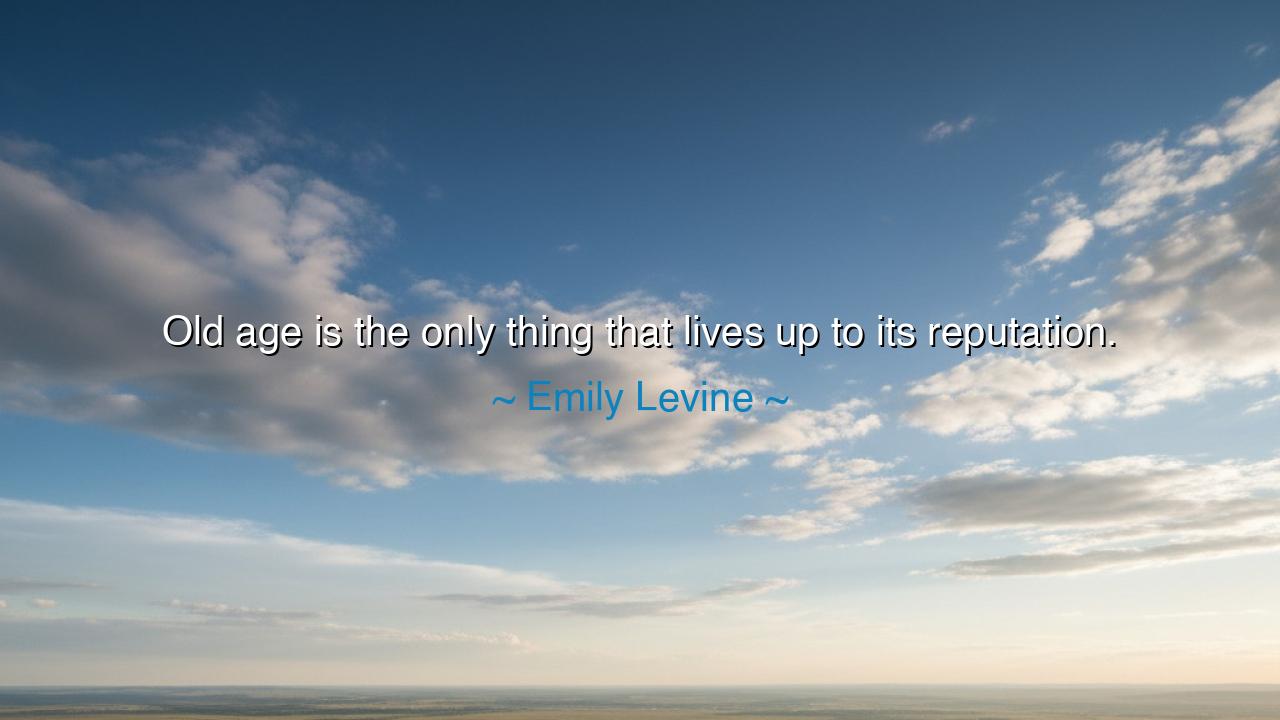
Old age is the only thing that lives up to its reputation.






In the passage of time, there is a truth that comes to each of us, unbidden yet inevitable: old age. In a world that reveres youth and all the vitality that comes with it, Emily Levine’s words stand out with remarkable clarity and wisdom: "Old age is the only thing that lives up to its reputation." These words strike a chord because, unlike the many promises and ideals that life offers—many of which fade or disappoint with the passing years—old age does not betray us. It comes not as a whisper, but as a certainty, and it lives up to the expectations set by time itself. For in old age, we find not only the physical decline we often dread but also the wisdom, the insight, and the resilience that come from living a full life.
The ancients, too, acknowledged the inevitability and the dual nature of old age. In the Epic of Gilgamesh, one of the earliest stories of human existence, Gilgamesh, the mighty king, seeks immortality not out of vanity, but out of a deep fear of the loss of life and the approach of death. In his quest, he learns that immortality is reserved only for the gods, and that, like all men, he must embrace death. Yet, the wisdom that comes from old age, he discovers, holds its own form of immortality. Old age brings knowledge that no physical strength can match—an understanding of the transient nature of life, and the preciousness of each moment.
In the life of Socrates, we see an example of this. Despite the fact that he lived into his sixties, an old age by the standards of ancient Greece, it was the wisdom of his years—his insights into truth, justice, and the human soul—that defined him, not the youthful energy that many might expect of a philosopher. Socrates embraced his old age as a time of deeper reflection and teaching. He spoke to the young, not as one who was past his prime but as one whose experience gave him the power to question, to challenge, and to enlighten. His old age did not diminish his spirit but only deepened the clarity of his vision. In this way, Socrates lived up to the reputation that old age promised—a life of profound insight.
Similarly, Moses, a figure revered by many cultures, led his people for many years, and it was in his later years that he displayed his greatest leadership and wisdom. In the Biblical narrative, despite his advanced age, Moses continues to guide and inspire those around him, offering insight into the meaning of faith and courage. His ability to lead the Israelites out of Egypt, to bring them to the brink of the Promised Land, was not just an act of physical strength, but of spiritual and moral fortitude, honed over decades of life’s challenges. Old age, for Moses, became a time of deep influence, not weakness.
However, Levine’s words carry a certain irony—for while old age does indeed live up to its reputation in all its fullness, it also brings with it a reckoning. The physical decline we face as we grow older is undeniable. The body that once carried us with strength and agility slows, and the mind can become clouded with time. Yet, this very decline offers an opportunity for acceptance. In old age, we are confronted with the transient nature of existence, a lesson that can lead to profound peace if we choose to embrace it. The ancients knew that death and decay were not enemies to be feared but natural parts of the human experience, offering a deeper understanding of life itself.
The lesson of Levine’s reflection, then, is one of acceptance and wisdom. Just as old age comes inevitably, it is how we meet it that defines our experience. We can resist the slow march of time, or we can embrace the opportunity to deepen our understanding of ourselves and the world. Old age does not demand that we stop living; rather, it calls us to live with even more purpose, to use the knowledge we have gained over a lifetime to help others and to find meaning in the simpler aspects of life. It challenges us to accept our imperfections, to find joy in the moments we have left, and to pass on what we have learned to those who come after us.
In our own lives, let us take the example of Socrates, Moses, and all those who have lived deeply, and strive to see old age not as a time of diminishment, but as a time of enlightenment. Let us remember that the wisdom that comes with age is not something to be feared, but something to be celebrated, for it is in that wisdom that we find our deepest purpose. And as we age, let us seek not to cling to our youthful strength, but to embrace the inner strength that time grants—the ability to live with grace, to pass on our knowledge, and to accept the natural flow of life, just as the ancients did. Old age is the reward of a life well-lived, and it is through acceptance and reflection that we can truly live up to its reputation.






AAdministratorAdministrator
Welcome, honored guests. Please leave a comment, we will respond soon